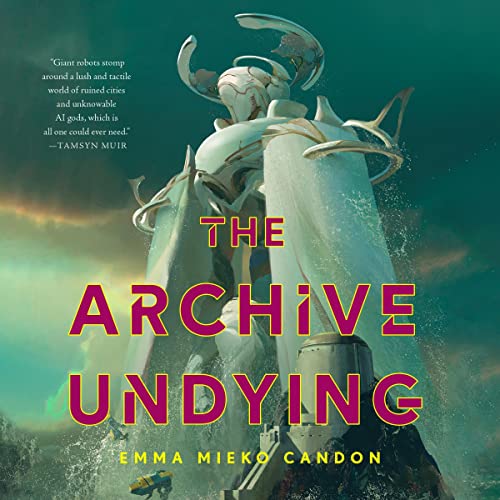 The Archive Undying (The Downworld Sequence, #1) by Emma Mieko Candon
The Archive Undying (The Downworld Sequence, #1) by Emma Mieko Candon Narrator: Yung-I Chang
Format: audiobook, eARC
Source: supplied by publisher via Edelweiss, supplied by publisher via NetGalley
Formats available: hardcover, ebook, audiobook
Genres: artificial intelligence, dystopian, mecha, science fiction
Series: Downworld Sequence #1
Pages: 496
Length: 16 hours and 28 minutes
Published by Macmillan Audio, Tordotcom on June 27, 2023
Purchasing Info: Author's Website, Publisher's Website, Amazon, Barnes & Noble, Kobo, Bookshop.org, Better World Books
Goodreads
The Archive Undying is an epic work of mecha sci-fi about Sunai, the immortal survivor of an Autonomous Intelligence that went mad and destroyed the city it watched over as a patron god. In the aftermath of the divine AI’s suicide, Sunai is on the run from those who would use him, either to resurrect what was lost or as the enslaved pilot of a gargantuan war machine made from his god’s corpse. Trouble catches up with Sunai when he falls into bed with Veyadi, a strange man who recruits him to investigate an undiscovered AI. Sunai draws ever closer to his cursed past, flirting with disaster and his handsome new boyfriend alike.
My Review:
The Archive Undying is a fractured story about broken people in a shattered world. Everything about this story, the people, the place, even the story itself, is in jagged pieces.
But with everything in jagged pieces, while it makes the characters compelling, and the world they live in a fascinating puzzle, the fractured jaggedness of the story itself makes the whole thing hard to follow.
Which makes describing the thing more than a tad difficult. Because you’re never quite sure what’s going on – even after the end – because you don’t know how anything or anyone got to be who, where and what they were at the point things start. Or even what the point of what they did might have been.
That’s true of the characters, the institutions and the whole entire world they inhabit. Because it’s all been corrupted. Not by the usual human forms of corruption – well, honestly, that too – but because everything in this world was run by autonomous AIs, and someone or something, both in the distant past and in the immediate present, introduced corruption into those AIs’ codes that caused them to fall. And to die.
At least as much as an AI can die.
So the story begins with Sunai. Or at least the story we drop into begins from Sunai’s point of view. He’s a salvage rat hiding a bitter truth from himself – but as it turns out Sunai is lies and bitter truths pretty much all the way down.
So is everyone – and everything – else. But the more of all those perspectives of lies and deceptions and bitter truths and sorrows we see, the more it all comes back to Sunai. And to the bitterest truth of all that he has hidden so deep that it will take an invasion of rogue mechs and rapacious AIs destroying his city to finally bring it to light.
 Escape Rating B: I listened to The Archive Undying in its entirety, and I have to say that its the narrator that carried me through all SIXTEEN AND A HALF HOURS. The narrator didn’t just do a good job of voicing all the many, many characters, but by literally being in their heads and not my own it allowed me to care enough about the individuals to be willing to experience the whole constantly twisting saga. If I’d been reading this as text, if I’d been in my head instead of theirs, I’d have DNF’d fairly early because the sheer number of changes in perspectives combined with unsatisfying hints of the world they occurred in would have driven me mad in short order. YMMV.
Escape Rating B: I listened to The Archive Undying in its entirety, and I have to say that its the narrator that carried me through all SIXTEEN AND A HALF HOURS. The narrator didn’t just do a good job of voicing all the many, many characters, but by literally being in their heads and not my own it allowed me to care enough about the individuals to be willing to experience the whole constantly twisting saga. If I’d been reading this as text, if I’d been in my head instead of theirs, I’d have DNF’d fairly early because the sheer number of changes in perspectives combined with unsatisfying hints of the world they occurred in would have driven me mad in short order. YMMV.
The Archive Undying is a story that expects a lot from its readers, probably more than it is likely to get. Which is somewhat ironic, as Sunai, the being who stands more-or-less as its protagonist has learned to expect very little, and is often surprised when he gets even that.
But then, that’s the thing about this book, in that if the reader can come to care about the characters, particularly Sunai the failed archivist and reluctant relic, then that reader will stick with the story to see what happens to Sunai and the ragtag band of friends, allies, frenemies and rogue AIs who have attached themselves to him. Or that he has attached himself to accidentally or by someone else’s purpose.
The story has so many perspectives, and it jumps between them so frequently and with so little provocation, that the story is difficult to follow. But more often than the reader expects, all of those fractured pieces come together in beauty – just the way the bits of color in a kaleidoscope suddenly shift into a glorious – if temporary – whole.
I left this story with three completely separate – almost jagged – thoughts about it.
Because we spend this story inside pretty much all of the characters’ heads – even the characters that don’t technically HAVE heads, and because so many of their actions have gone horribly wrong and they’re all full to the brim with regret and angst, this struck me as a ‘woulda, coulda, shoulda’ kind of story. We see their thoughts, they’re all a mess all the time, they’ve all screwed up repeatedly, and they’re all sorry about almost everything they’ve done – even as they keep doing the thing they’re sorry about.
Second, as a question of language, and because I listened to this rather than read the text, I got myself caught up in the question of whether the word, and more of the characters than at first seemed, was ‘relic’ or ‘relict’ as they’re pronounced the same. Sunai, and others, are referred to as ‘relics’ of the mostly dead AI named Iterate Fractal – or one of its brethren. But a ‘relic’ is an object of religious significance from the past, and a ‘relict’ is a survivor of something that used to exist in a larger or active form but no longer does. Not all of the autonomous AIs were worshipped as gods, but they all left relicts behind.
There’s a part of me that keeps thinking that at its heart, The Archive Undying is a love story. Not necessarily a romance – but rather a story about the many and varied ways that love can turn toxic and wrong. To the point where even when it does come out right the selected value of right is tenuous and likely to break at the first opportunity.
An opportunity we’ll eventually get to see. The Archive Undying is the first book in the projected Downworld Sequence, implying that there will be more to come even if the when of it is ‘To Be Determined’. I think I got invested in the characters enough to see what happens to them next – and I have hope that maybe the many, many blanks in the explanation of how things got to be this bad will get filled in in that next or subsequent books in the duology. But after the way this first book went, I KNOW I’ll be getting that second one in audio because the narration of this first book by Yung-I Chang is what made the whole thing possible for me and I expect him to carry me through the next one as well.
